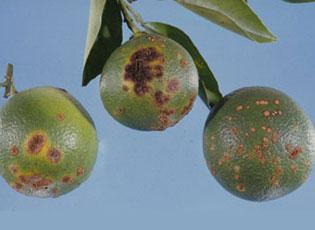Xanthomonas axonopodis pv. citri
Citrus canker, Citrus bacterial canker
Believed to have originated in Southeast Asia or India (Polek 2007)
First discovered in 1910, but eradicated in 1931; another outbreak was discovered in 1986, and again in 1995 (Dewdney 2013)
First arrived in seedlings imported from Japan in 1910 (Dewdney 2013)
Bacterial disease that infects citrus trees, where it destroys fruit and causes decreased production (CABI)

Citrus canker, fruit symptoms on sweet orange
Photo by Jeffrey W. Lotz; Florida Department of Agriculture and Consumer Services
Find more images
Spotlights
Distribution / Maps / Survey Status
Quarantine
Federally Regulated
Videos
All Resources
Selected Resources
The section below contains highly relevant resources for this species, organized by source.
Partnership
Federal Government
International Government
State and Local Government
Academic
Professional
CABI. Invasive Species Compendium. Xanthomonas citri pv. citri (Asiatic citrus canker). CAB International. [Accessed Aug 10, 2023].
Dewdney, M.M., P.D. Roberts, J.H. Graham, K.R. Chung, and M. Zekri. 2013. Homeowner Fact Sheet: Citrus Canker [PDF, 130 KB]. University of Florida, Institute of Food and Agricultural Sciences Extension. Electronic Data Information Source Publication #PP194.
Polek, M., G. Vidalakis, and K. Godfrey. 2007. Citrus Bacterial Canker Disease and Huanglongbing (Citrus Greening). University of California, Division of Agriculture and Natural Resources. Publication 8218.
 An official website of the United States government.
An official website of the United States government.